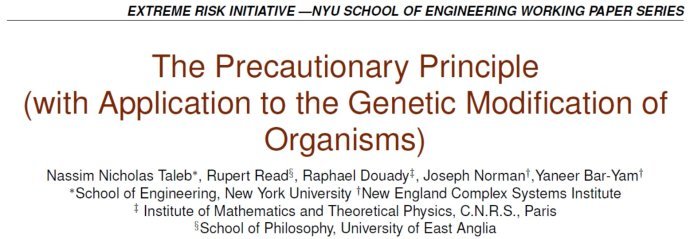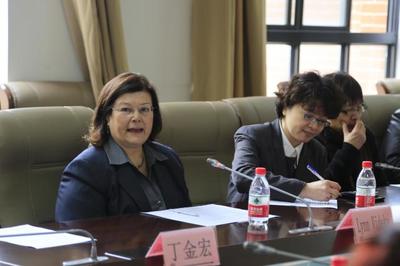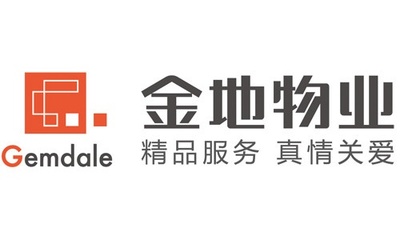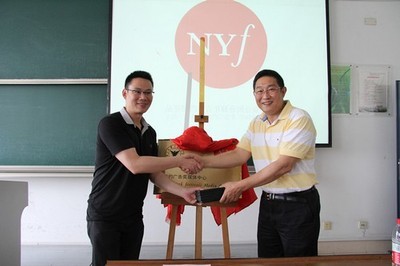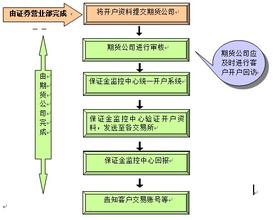塔勒布教授发表的研究论文标题为《预防性原则》,完全是关于管理风险,而不是等待这样的风险显现。塔勒布教授虽然认为任何一种转基因种子破坏地球的风险非常小,他论证人们低估了转基因的多米诺骨牌效应的总体风险。例如,如果一种转基因种子具有的导致生态系统灾难性崩溃的几率只有0.1%,那么,随着每研发一种新的转基因作物种子,这种几率将逐步增加。塔勒布写道,足够的时间必然会触及“全生态灭绝屏障”,尽管每一种转基因种子的这种可能性极小。塔勒布教授的论据依据转基因生物代表的是系统性的风险而非局部风险取的事实。随着转基因产品继续出口到世界所有国家,自然界中的转基因能够控制的想法,是一种无法保证的想法。【基本事实:1)到目前为止,全球获“批准”大规模商业化种植的转基因作物,对环境、生态、生物多样性、有益微生物、动物与人类健康,无一不造成系统性危害!2)农业部颁发“安全证书”国内外所有转基因作物皆是研发公司与农业部监管部门内外勾结以造假、欺骗、作伪证方式用“假样品做假试验得造假结论”的结果!】
Renowned NYU Professor:GMOs Could LiterallyDestroy the Planet
著名纽约大学教授:转基因生物简直可以毁掉这个星球
转载自美国《生态观察》网站:http://ecowatch.com/2014/03/06/nyu-gmos-destroy-planet/
JohnDeike|March 6, 20141:52 pm|Comments268
Prof. Nassim Taleb, responsible to globalmankind
对全球人类负责人的纳西姆·塔勒布教授
Nassim Taleb, a renowned New York University (NYU)professor recently raised eyebrows when he saidgeneticallymodified organisms(GMOs) have the potential to cause “anirreversible termination of life at some scale, which could be theplanet.”
美国纽约大学一位著名教授纳西姆·塔勒布的表态:转基因生物有潜力造成“地球上的生命一定程度不可逆转终止”,让许多人深感意外。
What effects will the genetic manipulation ofnature have on our worldwideecosystem?
遗传性操控对我们世界范围生态系统将造成什么影响?
Photocourtesyof Shutterstock
Taleb, who specializes in risk engineering, hasoutlined the dangers of GMOs inThePrecautionary Principle, a paper recently madeavailable to the public.
塔勒布教授,专门从事风险工程研究,在最近公开发表的论文《预防性原则》中列出了转基因生物的危险。
The Precautionary Principle (with Application tothe Genetic Modification of Organisms) 预防性原则(应用于转基因生物) 作者:Nassim NicholasTaleb1, Rupert Read2, RaphaelDouady3, Joseph Norman4, YaneerBar-Yam4 就职机构: 1 School of Engineering, New YorkUniversity 纽约大学工程学院 2 School of Philosophy, University of EastAnglia 东安基利亚大学哲学学院 3 Institute of Mathematics and Theoretical Physics,C.N.R.S., Paris 法国国家科学研究中心数学与理论物理研究所 4 New England Complex Systems Institute 新英格兰复杂系统研究所 Published by: EXTREME RISK INITIATIVE —NYU SCHOOL OF ENGINEERINGWORKING PAPER SERIES 发表:《极端风险倡议--纽约大学工程学院工作论文系列》 Date of Paper: September 4, 2014 论文日期:2014年9月4日 Abstract—The precautionary principle (PP) states that ifan actionor policy has a suspected risk of causing severe harm tothe public domain (affecting general health or the environmentglobally), the action should not be taken in the absence ofscientific near-certainty about its safety. Under these conditions,the burden of proof about absence of harm falls on those proposingan action, not those opposing it. PP is intended to deal withuncertainty and risk in cases where the absence of evidence and theincompleteness of scientific knowledge carries profoundimplications and in the presence of risks of "black swans",unforeseen and unforeseable events of extreme consequence. ... Ouranalysis makes clear that the PP is essential for a limited set ofcontexts and can be used to justify only a limited set of actions.We discuss the implications for nuclear energy and GMOs. GMOsrepresent a public risk of global harm, while harm from nuclearenergy is comparatively limited and better characterized. PP shouldbe used to prescribe severe limits on GMOs. 摘要:预防性原则指出,如果一项实施性政策具有对公共领域造成严重危害疑似风险(影响公众健康或者全球性环境),那么,在缺乏对其安全性科学上近乎确定性之前,则不应当实施。在这样的状况下,举证缺乏证据的危害是否存在的负担由提议该项行动的一方承担,而不是由反对这种行动的一方承担。预防性原则的目的是处理不确定性和风险尚不够清楚的情况,这样的情况中缺乏证据和科学知识的不完全性带来深远的影响并存在“黑天鹅”式的风险以及可能带来不可预见的或者尚未预见的极其严重后果。... 我们的分析清楚表明,对于有关情况不清下证明仅有有限组行动的情况,预防性原则至关重要。我们讨论了预防性原则对核能与转基因生物的意义。转基因生物代表造成全球性危害的公共风险,与转基因生物造成的风险相比,核能的危害反而相对有限而且具有更清楚的特征。应当采用预防性的原则来应对我们对于转基因生物复杂系统认识的严重局限性。 节录: For the impact of GMOs on health, the evaluationof whether the genetic engineering of a particular chemical(protein) into a plant is OK by the FDA is based upon consideringlimited existing knowledge of risks associated with that protein.The number of ways such an evaluation can be in error is large. Thegenetic modifications are biologically significant as the purposeis to strongly impact the chemical functions of the plant,modifying its resistance to other chemicals such as herbicides orpesticides, or affecting its own lethality to other organisms—i.e.its antibiotic qualities. 对于转基因生物对健康的影响,美国食品药物管理暑(FDA)对作物转基因转入某种特定的化学成分(蛋白)的评价认为没有问题,完全依据对那种蛋白的风险相关的非常有限的现有知识。多种方式造成这种评价有误的可能性很大。转基因修饰具有生物性显著作用,因为其目的是强烈影响农作物的化学功能,修饰它对草甘膦或杀虫剂的抗性,或者修饰它对其他生物的致死性--即期抗生素性质。 The limited existing knowledge generally does notinclude long term testing of the exposure of people to the addedchemical, even in isolation. The evaluation is independent of theways the protein affects the biochemistry of the plant, includinginteractions among the various metabolic pathways and regulatorysystems—and the impact of the resulting changes in biochemistry onhealth of consumers. The evaluation is independent of itsfarm-ecosystem combination (i.e. pesticide resistant crops aresubject to increased use of pesticides, which are subsequentlypresent in the plant in larger concentrations and cannot be washedaway). 现有局限性的知识通常不包括对于人们长期接触添加的这些化学成分或提取物进行长期试验。所进行的评价独立于这些转基因蛋白对转基因作物的生物化学实际影响,包括这些转基因蛋白在不同代谢途径以及监管系统之间的相互作用-- 以及它们所造成的生物化学变化对消费者健康的影响。这些评价还独立于其农场--生态系统结合(如,抗农药作物与增加使用农药关联,它们造成转基因作物中更大浓度的农药残留而且无法清洗除掉)。 Rather than recognizing the limitations of currentunderstanding, poorly grounded perspectives about the potentialdamage with unjustified assumptions are being made. Limitedempirical validation of both essential aspects of the conceptualframework as well as specific conclusions are being used becausetesting is recognized to be difficult. 不是承认现有认识的局限性,而是基于不合理假设对潜在损害做出缺乏依据的愿景判断。因为认识到试验难做,对概念框架的根本性方面以及具体的结论仅进行有限的实证验证。 We should exert the precautionary principle here –our non-naive version – because we do not want to discover errorsafter considerable and irreversible environmental and healthdamage. 正是在这里我们应当实施预防性原则 --我们非天真的版本 --因为我们不要在发生了客观的与不可逆转环境性与健康损害后才发现我们的错误。 One of the most extensively debated cases for GMOsis a variety of rice—"golden rice"—to which has been added aprecursor of vitamin A as a potential means to alleviate thisnutritional deficiency, which is a key medical condition affectingimpoverished populations. Since there are alternatives, includingtraditional vitamin fortification, one approach is to apply a costbenefit analysis comparing these approaches. 最为广泛争论的一个转基因生物体案例是“黄金大米,通过转基因添加了维生素A的一种前体,作为缓解营养性维生素A缺乏症的一种潜在方法,这是影响贫困人口健康的一项关键性状况。由于存在着替代解决方法,包括传统型维生素强化,一种途径是对这些不同的途径进行成本益处分析。 Counter to this approach stands both the largelyunknown risks associated with the introduction of GMOs, and theneed and opportunities for more systemic interventions to alleviatenot just malnutrition but poverty and hunger worldwide. 与这种途径相对,既有引入转基因相关的相当大风险,还有采取更为系统性敢于的需要和机会,不仅缓解仅仅营养缺乏,而且缓解世界范围的贫困与饥饿。 While great attention should be placed onimmediate needs, neglecting the larger scale risks is unreasonable[10]. Here science should adopt an unyielding rigor for both healthbenefit and risk assessment, including careful application of thePP. Absent such rigor, advocacy by the scientific community notonly fails to be scientific, but also becomes subject to challengefor short term interests, not much different from corporateendorsers. Thus, cutting corners on tests, including tests withoutadequate consent or approvals performed on Chinese children [15],undermines scientific claims to humanitarian ideals. 尽管应当对于紧急的需要给予重视,忽略大范围风险也不合理[10]。在这里,严谨科学应该对健康益处和风险进行最严格的评估,包括谨慎应用预防性原则。缺乏这种严格性,科学界所倡导的不仅丧失科学性,而且因为追求短期利益受到挑战,以至与企业代言人无异。因此,切除试验的锐角,在没获得充分同意与批准情况下在对中国儿童做人体试验[15],削弱了人道主义理想的科学主张。 Given the promotion of "golden rice" by theagribusiness that also promote biofuels, their interest inhumanitarian impacts versus profits gained through wider acceptanceof GMO technology can be legitimately questioned [16]. 考虑到”黄金大米”得到同时推动生物燃料的农业公司推动,可以合理质疑他们对人道主义影响相对转基因技术获得更广泛接受带来的利润的兴趣[16]。 The Rio Declaration on Environment and Developmentpresents it as follows: "In order to protect the environment, theprecautionary approach shall be widely applied by States accordingto their capabilities. Where there are threats of serious orirreversible damage, lack of full scientific certainty shall not beused as a reason for postponing cost-effective measures to preventenvironmental degradation." 《里约环境与发展宣言》对预防性原则这样描述:“为了保护环境,各国应根据它们的能力广泛采取预防性措施。凡有可能造成严重的或不可挽回的损害的地方,不能把缺乏充分的科学肯定性作为推迟采取防止环境退化的费用低廉的措施的理由。” 原文信息来源:Nassim Nicholas Taleb et al., The PrecautionaryPrinciple (with Application to the Genetic Modification ofOrganisms), Extreme Risk Initive -- NYU School of EngineeringWorking Papers Series, 2014-09-04 http://www.fooledbyrandomness.com/pp2.pdf 《里约环境与发展宣言》中英文信息来源: http://news.xinhuanet.com/ziliao/2002-08/21/content_533123.htm |
The threat
威胁
Often, GMO seeds are favored because of their ability to yieldlarger harvests and avoid certain pests or weeds that usually eatup some of their productivity, reportsDailyFinance.
有人声称转基因作物产量更高的能力以及能够避免吃掉部分产量的某些害虫或者野草,因此转基因种子往往因此得到喜爱。
Taleb’s primary concern isn’t that ingesting GMOsis necessarily bad for people; rather, he’s focused on what effectsthe genetic manipulation of nature will have on the worldwideecosystem.
塔勒布教授的主要担心并非来自摄入转基因对人类有害;反而来自他聚焦关注遗传性操控自如对世界范围生态系统将产生什么影响。
While Taleb concurs the risk of any one GMO seedruining the planet is incredibly small, he argues that people areunderestimating the domino effect of risk that’sinvolved.
虽然塔勒布教授认为任何一种转基因种子破坏地球的风险非常小,他论证人们低估了转基因的多米诺骨牌效应的总体风险。
For example, if one genetically modified seedproduced holds a 0.1 percent chance of causing a catastrophicbreakdown of the ecosystem, then the probability of such an eventwill only increase with each new seed that’sdeveloped.
例如,如果一种转基因种子具有的导致生态系统灾难性崩溃的几率只有0.1%,那么,随着每研发一种新的转基因作物种子,这种几率将逐步增加。
Taleb writes that given enough time the “totalecocide barrier” is bound to be hit despite incredibly smallodds.
塔勒布写道,足够的时间必然会触及“全生态灭绝屏障”,尽管每一种转基因种子的这种可能性极小。
The argument hinges on the fact that GMOsrepresent a systemic, and not localized, risk. As GMO goodscontinue to be exported to countries throughout the world, the ideaof being able to control GMOs in nature is impossible toguarantee.
塔勒布教授的论据依据转基因生物代表的是系统性的风险而非局部风险取的事实。随着转基因产品继续出口到世界所有国家,自然界中的转基因能够控制的想法,是一种无法保证的想法。
As Taleb says, “There are mathematical limitationsto predictability in a complex system, ‘in the wild,’ which is whyfocusing on the difference between local (or isolated) and systemicthreats is a central aspect of ourwarnings.”
如塔勒布教授说的那样,“‘野外中’这样的复杂系统中的预测性存在着数学性限制,这就是为什么我们警告聚焦于局部的(或者隔绝的)威胁与系统性威胁差别这个核心。
Responding tocritics
回应批评
GMO supporters have criticized his work as GMOshave yet to significantly harm the ecosystem, but Taleb argues thatpoint strengthens his theory.
转基因支持者以转基因生物还没有显著危害生态系统为由批评塔勒布教授的研究结论,但是塔勒布教授强调,正是这一点加强了他的理论的可信度。
Daily Finance reports:
《每日金融》报告:
The Precautionary Principle—which is what Taleb calls his warning—is allabout managing risk, not about waiting for it to surface. The factthat GMOs are a systemic entity is undeniable. Taleb is equallyskeptical of all entities that carry systemic risk—liketoo-big-to-fail banks.
塔勒布教授发表的研究论文标题为《预防性原则》,完全是关于管理风险,而不是等待这样的风险显现。转基因生物不可否认是一种系统性实体是不可否认的事实。对于所有携带系统性风险的实体,如“规模巨大不会垮掉的银行”,塔勒布教授持相同的怀疑。
We don’t, as Taleb says, argue that a game ofRussian roulette issaferwitheach empty barrel we find. It is, in fact, moredangerous.
塔勒布教授强调,我们不会因为搬动左轮手枪每碰到一次空弹舱,就认为这种俄罗斯轮盘赌游戏更加安全。事实上,每碰到一次空弹舱,它的危险反而更高。
Renowned Expert: GMOs Pose More Risk Than WeThink
著名专家:转基因生物造成比我们想象的更大的风险
http://www.dailyfinance.com/2014/03/05/renowned-expert-gmos-pose-more-risk-than-we-think/
Brian Stoffel, The Motley FoolMar 5th 2014 2:00PM Updated Mar 5th 20142:15PM
Source: Nassim Taleb, Quozio
Genetically modified organisms (GMOs) have theability to cause "an irreversible termination of life at somescale, which could be the planet."
转基因生物有潜力造成“地球上的生命一定程度不可逆转终止”
This warning, as emotional and overstated as itsounds, isn't coming from some anti-science zealot or conspiracytheorist.
这样的警告,尽管听起来比较情绪化和夸大,并非来自一位反科学狂热者或阴谋论者。
It is, instead, coming from Nassim Taleb,distinguished professor of risk engineering at New York University,author of best-sellersThe BlackSwanand Fooled by Randomness, andshrewd investor who made a fortune when "blackswans" like September 11and the GreatRecession occurred.
这样的警告来自纳西姆·塔勒布,纽约大学风险工程特聘教授,畅销书《被随机现象糊弄的黑天鹅》的作者,他曾在911与大危机发生时发了一笔大财的精明的投资者。
Recently, he's been making his feelings on GMOscrystal clear: they're dangerous to the overall health of ourplanet. In apaperthat'savailable to the public, yet still in draft form, Taleb -- alongwith two colleagues -- lay out their case.
最近,他让大家对他对转基因生物的感觉晶莹剔透清晰:它们对我们星球的总体健康非常危险。最近向公众公开的文章初稿中,塔勒布及其两位同事列出了他们的理由。(注:这篇文章《预防性原则》2014年9月4日已经发表。)
The threat
威胁
GMOs are historically different from theirnaturally occurring peers in that their genetic make-up has beenaltered in a laboratory before being planted in fields.
转基因生物历史性地与它们自然发生的对应生物不同,农田中种植前在实验室中已经改变了其遗传结构。
Often, these types of seeds are favored because oftheir ability to yield larger harvests and avoid certain pests orweeds that usually eat up some of their productivity.
有人声称转基因作物产量更高的能力以及能够避免吃掉部分产量的某些害虫或者野草,因此转基因种子往往因此得到喜爱。
Source: Lindsay Eyink, via WikimediaCommons
Taleb's primary concern isn't that ingesting GMOsis necessarily bad for us; he's instead focused on the monumentalthreat such technology has on our worldwide ecosystem.
塔勒布教授的主要担心并非来自摄入转基因对人类有害;反而来自他聚焦关注遗传性操控自如对世界范围生态系统将产生什么影响。
While Taleb agrees that the relative risk of anyone transgenic seed ruining the ecosystem is incredibly small,people are still underestimating the risks involved.
虽然塔勒布教授同意任何一种转基因种子破坏地球的风险非常小,他认为人们低估了它们涉及的风险。
That's because, as humans, we are ill equipped tounderstand the mathematics behind such risks. Let's say each GMseed that's produced holds a 0.1% chance of -- somehow, in theintricately interdependent web of nature -- leading to acatastrophic breakdown of the ecosystem that we rely on for life.All by itself, it doesn't seem too harmful, but with each new seedthat's developed, the risk gets greater and greater.
这是因为,作为人类,我们已有的知识使我们难于理解这样的风险后边的数学。让我们说,每一种转基因种子具有0.1%几率-- 在复杂的相互依赖的网络性质自然中 -- 导致对我们的生命赖以生存的生态系统造成灾难性的的崩溃。一个一个看,看来没有多大危害,但是,随着每研发一种新的转基因种子,风险变得越来越大。
The chart below demonstrates how, over time, evena 0.1% chance of ecocide can be dangerous.
下边的曲线图表明,随着时间延伸,造成生态崩溃即便0.1%几率也很危险。
I cannot stress enough that the probabilities I amusing arefor illustrative purposes only.Neither I, nor Taleb, claim to know what the chances are of any onetype of seed causing such destruction.
我必须强调我使用的几率仅用于示意目的。无论我,或者塔勒布教授,都不知道任何一种转基因种子造成这样毁坏的几率为多少。
The focus, instead, should be on the fact that the"total ecocide barrier" is bound to be hit, over a long enoughtime,with even incredibly small odds. Talebincludes a similar graph in his work, but no breakdown of theactual variables at play.
关键点是,每一种转基因种子造成这样毁坏的几率即便非常小,随着一种又一种转基因种子研发出来,随着时间延伸,迟早将触及造成“总体生态系统崩溃障碍”。塔勒布教授的研究论文中列出一个类似的曲线图,但是没有分解发生作用的实际变量。
示意图:研发的转基因种子类型数量与造成总体生态系统崩溃的几率
Source: Author's input, based on Taleb, Read, andBar-Yam paper
As Taleb says, "Over time, something bound to hitthe [ecocide] barrier is about guaranteed to hit it."
如塔勒布教授说的那样,“随着时间延伸,可以保证触及生态系统崩溃障碍。”
Why be so worried if the level of threat isn'tknown?
威胁水平不清楚为何如此令人担心?
The crux of this argument hinges on the fact thatGMOs represent a systemic, and not localized, risk. Because thewind will blow where it wants to, insects will go -- and carry withthem -- what they please, and GM goods will surely be exported tocountries throughout the world, the concept of being able tocontrol GM traits in nature is impossible to guarantee.
这个论点的关键取决于这样的事实,转基因生物代表的是系统性的而不是局部的风险。因为,风在它愿意的地方刮,昆虫也去到它们愿意去的地方-- 并带着转基因一起去,而且转基因产品当然被出口到世界各处所有国家,因此“对自然界中的转基因予以控制“的概念无法得到保证。
As Taleb says, "There are mathematical limitationsto predictability in a complex system, 'in the wild,' which is whyfocusing on the difference between local (or isolated) and systemicthreats is a central aspect of ourwarnings."
如塔勒布教授说的那样,“‘野外中’这样的复杂系统中的预测性存在着数学性限制,这就是为什么我们警告聚焦于局部的(或者隔绝的)威胁与系统性威胁差别这个核心。
What it means for investors
对投资者意味着什么
Obviously,Monsanto,Syngenta,DowChemical,andDuPonthave a vestedinterest in the success of GMOs -- as these four produce the vastmajority of GMOs in use right now.
显然,孟山都、先正达、陶化学,以及杜邦有既得利益在转基因的成功中 - 因为这四家公司目前持有最大多数转基因生物的专利权。
And if authorities start to heed Taleb's warnings,it would cause investors in these four companies to take a serioushit.
如果政府当局开始注意到塔勒布教授的警告,将导致这四个企业的投资者遭到严重打击。
But the amount of revenue that each companyderives from GMO activity varies quite a bit. Here's how eachcompany's revenue total breaks down in their most recent annualreports.
但是,这四家企业的业务收入中自转基因业务获得的收入比例相差很大。依据这四家公司最新的年度报告,他们的转基因业务收入比例分别如下:
Company 公司 | % of Rev fromGMO-related products 转基因相关产品收入在总收入中% |
Monsanto 孟山都 | 60% to 90% |
Syngenta 先正达 | 52% |
DuPont 杜邦 | 23% |
Dow Chemical 陶化学 | 2% to 12% |
Source: SEC filings.
来源:证监会档案
Dow Chemical herbicides and pesticides account for10% of total sales, and cannot be determined to be a by-product ofGMO seeds or not.
陶化学公司的除草剂与杀虫剂占到销售总额的10%,无法决定是否是转基因种子的副产品。
Monsanto derives about 30% of its revenue from"agricultural productivity," which is the word they use forherbicides. It's hard to tell how much of that is sold because ofthe Roundup Ready GMO seeds that are sold. Either way, it's clearthat GMOs are a huge part of Monsanto's business.
孟山都收入的大约30%来自“农业生产力”,即他们对除草剂用的词。难于判断孟山都的除草剂中多大比例是抗草甘膦转基因种子销售带来的销售。无论如何,转基因是孟山都业务很大部分。
DuPont and Dow Chemcial, which have far morediverse business segments, are less exposed to sensitivities orpossible regulations regarding GMOs.
杜邦与陶化学公司,他们的业务更加多样化,对于转基因生物相关可能的监管规定的敏感性比其他两家公司低。
Answering the critics
对批评者的回答
Unsurprisingly, Taleb has run into a fair share ofcriticism for his views.
并非意外,塔勒布教授的看法遭遇了相当多的批评。
But Taleb also addresses those concerns in hispaper. Here's how he responds to the most commoncritiques:
但是,塔勒布教授的论文回应了这些批评者。下边列出他如何答复最为普遍的一些批评:
Humans have been modifying plants for years viaselective breeding and tinkering with crops.
批评:“通过选择性育种和修饰作物人类多年来一直在修改作物。”
While this may be true, Taleb claims there's afundamental difference between this and GMOs. "There is nocomparison between the [bottom-up] tinkering of selective breedingand the top-down engineering of taking a gene from an organism andputting it into another."
尽管这可能真实,塔勒布教授强调选择性育种与转基因生物有实质性区别。“[自下而上]选择性育种修饰与取另外生物的基因置入另外生物的自上而下工程(转基因)之间无法相比。”
Furthermore, Taleb claims that nature has neverallowed such a systemic risk to evolve. "The planet took aboutclose to zero risks of ecocide in trillions of variations over 3billion years, otherwise we would not have beenhere."
此外,塔勒布教授强调,自然界从来不允许进化这样的系统性风险。“我们的星球在生态系统崩溃近乎零风险情况下发展了超过30亿年,否则这个星球目前不可能发展到目前的程度。”
How about the risk of famine withoutGMOs?
批评:“饥荒的危险在没有转基因情况下怎样?”
This is "a deceitful strategy, no different fromurging people to play Russian roulette in order to get out ofpoverty." That's because, as his probability shows, we'll all endup dying in the end when we hit the ecocide barrier.
这是一种“诡诈的策略,与呼吁人们通过玩俄罗斯轮盘赌摆脱贫困没有区别”。这是因为,如同他的几率表明的那样,(如果允许目前情况继续的话--译注)达到生态系统崩溃临界线时我们都将死掉。
New technologies could solve these problems ifthey arise
批评:“这些问题发生时新的技术将解决它们。”
The whole point is that these threats could laydormant for years before they finally surface. When they do, theywould be difficult to control, and could act fast.
要点是,这些威胁浮现到表面前可能已经潜伏多年。一旦浮现,这样的威胁已经难于控制,而且迅速造成危害。
Risk is inherent in everything. We can't just beparalyzed by fear and not progress.
批评:“风险固有在一切之中。我们不能因为恐惧瘫痪不懂而不进步。”
The risk of "generalized human extinction" is notinherent in everything. That's because most consequences arelocalized, not systemic. And progress can be made using bottom-uptechniques that have worked for eons.
“广义的人类灭绝”的风险并非固有在一切之中。这是因为大部分后果是局部的,不是系统性的。而且,进步可以通过工作很久的自下而向上技术实现。
There is no evidence that this type of ecocidecould really happen
批评:“没有证据表明这种类型生态系统崩溃确实可能发生。”
The precautionary principle -- which is what Talebcalls his warning -- is all about managing risk, not about waitingfor it to surface. The fact that GMOs are a systemic entity isundeniable. Taleb is equally skeptical of all entities that carrysystemic risk -- like too-big-to-fail banks.
预防性原则 -- 塔勒布教授这样称呼他的警告 --完全是关于管理风险,而不是等待这样的风险显现。转基因生物不可否认是一种系统性实体是不可否认的事实。对于所有携带系统性风险的实体,如“规模巨大不会垮掉的银行”,塔勒布教授持相同的怀疑。
New organisms have been introduced into newecosystems before and this hasn't caused totalcollapse
批评:“新的生物过去就曾经引入新的生态系统而且没有造成生态系统总体崩溃。”
Many of these new organisms -- people often referto potatoes or tomatoes being introduced into the Old World fromthe New World -- were naturally occurring in nature, or the resultof bottom-up tinkering.
许多这些新的生物体 -- 人们往往提到来自新世界(西方人原先没有进入的区域--译注)的马铃薯(土豆)或者番茄(西红柿)被引入老的世界(西方人的世界)-- 是自然界中自然产生的,或者是自下而上选择性育种修饰的结果。
Also, the fact that there's no evidence showingthat GMOs have so far caused system damage doesn't mean it won'teventually surface. We don't, as Taleb says, argue that a game ofRussian rouletteissaferwith each emptybarrel we find. It is, in fact, more dangerous.
而且,还没有表明转基因生物到目前为止造成系统性破坏的事实,并不能意味着系统性破坏不会最终显现。如塔勒布教授论证的那样,我们不会因为搬动左轮手枪每碰到一次空弹舱,就认为这种俄罗斯轮盘赌游戏更加安全。事实上,每碰到一次空弹舱,它的危险反而更高。
By no means am I as smart as Taleb when it comesto risk, and I don't have a degree in agricultural sciences. I dofind Taleb's assertions to be a little alarmist.
涉及到风险时,我绝对没有塔勒布那样聪明,而且我也没有农业科学领域的学位。我发现塔勒布的断言有点危言耸听。
At the same time, as someone who spends a quarterof every year working on a coffee farm in Costa Rica thattransitioned from conventional farming methods to permaculture ones-- and having seen the vast improvements in the overall ecosystemon the farm, I think it's wise to, at the very least, give somecredence to the concerns Taleb raises.
在此同时,作为每年有四分之一时间在哥斯达黎加的一个咖啡园工作,它从传统耕作方式转换为永久培育方式-- 见到这个咖啡园上的总体生态系统的广泛改进,因而我认为,对塔勒布提出的担心给予某些考虑至少是明智的。
After all, it's not that scientists are dumberthan Mother Nature; it's simply that Mother Nature has been aroundfor about 300,000 times longer than us humans, and what she'spicked to stay around have obviously passed the test oftime.
毕竟,这并不是说科学家们比自然界母亲更笨;而只是说,大自然已经存在的时间达到人类历史的30万倍,自然界选择生长到现在的生物显然通过了世界的考验。
 爱华网
爱华网